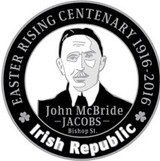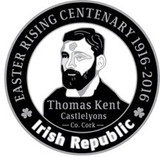
Seán Mac Diarmada 1916 Centenary Badge
Born in Leitrim, he emigrated to Glasgow in 1900 where he worked as a tram conductor, and from there came back to Belfast in 1902. A member of the Gaelic League, Mac Diarmada was sworn into the IRB by Denis McCullough, and transferred to Dublin in 1908 where he managed the IRB newspaper Irish Freedom in 1910.
Although afflicted with polio in 1911 and needing a walking stick, together with Tom Clarke, McCullough and Bulmer Hobson, Mac Diarmada is credited with revitalising the IRB and becoming a popular leader.
macdiarmada
Journalist Sean Mac Diarmada was in the GPO for the Rising. Below, seated third from left
(Images courtesy of National Library of Ireland and Kilmainham Gaol)
After the outbreak of the First World War in August 1914, he campaigned against Irishmen joining the British army, and was jailed under the Defence of the Realm Act.
In a speech at Tralee, Co Kerry he claimed: “The Irish patriotic spirit will die forever unless a blood sacrifice is made in the next few years.”
Mac Diarmada was said to be obsessively secretive in his planning, excluding many of his fellow IRB men from the Rising conspiracy.
A signatory of the Proclamation and a member of the Provisional Government, he spent
the Rising in the GPO.
Before his execution, Mac Diarmada wrote: “I feel happiness the like of which I have never experienced. I die that the Irish nation might live!”
He was executed by firing squad at Kilmainham on May 12. Mac Diarmada was unmarried.
Sean McDermott Street in Dublin is named in his honour as is Mac Diarmada rail station in Sligo, and Páirc Seán Mac Diarmada, the GAA ground in Carrick-on-Shannon. Sean MacDermott tower in Ballymun, which was demolished in 2005, was also named after him.
- Shipping:
- Calculated at Checkout
Related Products
- Shop
- An Phoblacht
- Badges/Pins
- Beanies/Hats/Caps
- Bobby Sands/Hunger Strikers
- Books/Calendars
-
CD/DVD
- CD/DVD
- All CD/DVD
- DVD's
- Easter/Lilies
- FLAGS
- FRIDGE MAGNETS/STICKERS
- Historical photographs
- Jackets
- Jerseys
- Jewellery/Coins
- Martin McGuinness
- MUGS
- Palestine
- Postcards
- Prints/Posters/Postcards
- SALE
- T-Shirts







